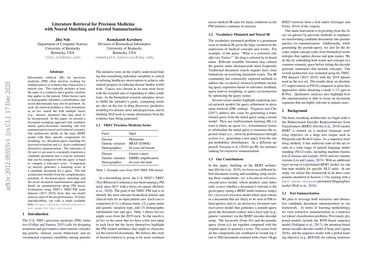Literature Retrieval for Precision Medicine with Neural Matching and Faceted Summarization
Information retrieval (IR) for precision medicine (PM) often involves looking for multiple pieces of evidence that characterize a patient case. This typically includes at least the name of a condition and a genetic variation that applies to the patient. Other factors such as demographic attributes, comorbidities, and social determinants may also be pertinent. As such, the retrieval problem is often formulated as ad hoc search but with multiple facets (e.g., disease, mutation) that may need to be incorporated. In this paper, we present a document reranking approach that combines neural query-document matching and text summarization toward such retrieval scenarios. Our architecture builds on the basic BERT model with three specific components for reranking: (a). document-query matching (b). keyword extraction and (c). facet-conditioned abstractive summarization. The outcomes of (b) and (c) are used to essentially transform a candidate document into a concise summary that can be compared with the query at hand to compute a relevance score. Component (a) directly generates a matching score of a candidate document for a query. The full architecture benefits from the complementary potential of document-query matching and the novel document transformation approach based on summarization along PM facets. Evaluations using NIST's TREC-PM track datasets (2017--2019) show that our model achieves state-of-the-art performance. To foster reproducibility, our code is made available here: https://github.com/bionlproc/text-summ-for-doc-retrieval.
PDF Abstract Findings of 2020 PDF Findings of 2020 Abstract




